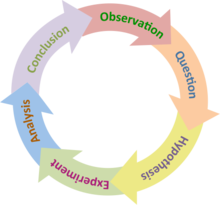ਮਿਥਿਆ ਵਿਗਿਆਨ
ਦਿੱਖ

ਮਿਥਿਆ ਵਿਗਿਆਨ (English: pseudoscience) ਵਿੱਚ ਉਹ ਬਿਆਨ, ਵਿਸ਼ਵਾਸਾਂ ਜਾਂ ਪ੍ਰਥਾਵਾਂ ਸ਼ਾਮਲ ਹੁੰਦੀਆਂ ਹਨ ਜੋ ਵਿਗਿਆਨਕ ਅਤੇ ਤੱਥਾਂ ਤੇ ਅਧਾਰਤ ਹੋਣ ਦਾ ਦਾਅਵਾ ਕਰਦੀਆਂ ਹਨ, ਪਰ ਵਿਗਿਆਨਕ ਵਿਧੀ ਦੇ ਅਨੁਕੂਲ ਨਹੀਂ ਹੁੰਦੀਆਂ।[1][4]
References
[ਸੋਧੋ]- ↑ Cover JA, Curd M, eds. (1998), Philosophy of Science: The Central Issues, pp. 1–82
- ↑ Hansson, Sven Ove (2008), "Science and Pseudoscience", Stanford Encyclopedia of Philosophy, Section 2: The "science" of pseudoscience
{{citation}}: Invalid|ref=harv(help); Unknown parameter|name-list-format=ignored (|name-list-style=suggested) (help) - ↑ (Shermer 1997)
- ↑ Definition:
- "A pretended or spurious science; a collection of related beliefs about the world mistakenly regarded as being based on scientific method or as having the status that scientific truths now have". Oxford English Dictionary, second edition 1989.
- "Many writers on pseudoscience have emphasized that pseudoscience is non-science posing as science. The foremost modern classic on the subject (Gardner 1957) bears the title Fads and Fallacies in the Name of Science. According to Brian Baigrie (1988, 438), '[w]hat is objectionable about these beliefs is that they masquerade as genuinely scientific ones.' These and many other authors assume that to be pseudoscientific, an activity or a teaching has to satisfy the following two criteria (Hansson 1996): (1) it is not scientific, and (2) its major proponents try to create the impression that it is scientific."[2]
- '"claims presented so that they appear [to be] scientific even though they lack supporting evidence and plausibility"(p. 33). In contrast, science is "a set of methods designed to describe and interpret observed and inferred phenomena, past or present, and aimed at building a testable body of knowledge open to rejection or confirmation"(p. 17)'[3] (this was the definition adopted by the National Science Foundation)
